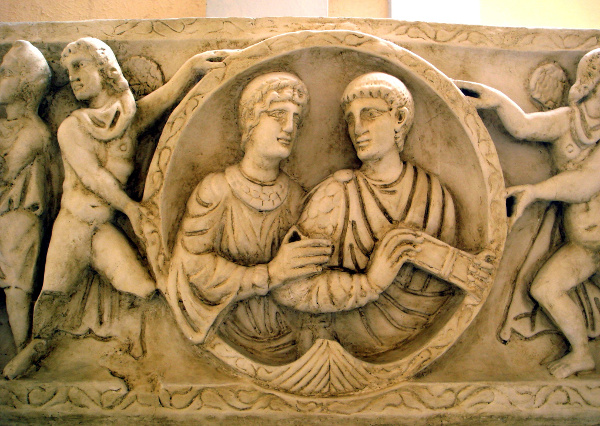Love of Neighbor
November 27, 2018

It is not enough to have love for our neighbor—-we should notice of what sort it is, and whether it is true. If we love our neighbor because he does us good, that is, because he loves us, and brings us some advantage, honor, or pleasure, that is what we call a love of complacency, and is common to us with the animals. If we love him for any good that we see in him, that is, on account of beauty, style, amiability or attractiveness, this is love of friendship, which we share with the heathens. Therefore, neither of these is a true love, and they are of no merit, because purely natural and of short duration, being founded upon motives which often cease to exist. In fact, if we love anyone because he is virtuous, or handsome, or our friend, what will become of this love if he should cease to be virtuous, or handsome, or to love us, or, still worse, if he should become our enemy? When the foundation upon which our love rested, sinks, how can it support itself! The true love which alone is meritorious and lasting is that which arises from the charity which leads us to love our neighbor in God and for God; that is, because it pleases God, or because he is dear to God, or because God dwells in him, or that it may be so. There is, however, no harm in loving him also for any honorable reason, provided that we love him more for God’s sake than for any other cause. Yet the less mixture our love has of other motives, the purer and more perfect it will be. Nor does this hinder us from loving some, such as our parents and benefactors, or the virtuous, more than others, when such preference does not arise from the greater good they do to us, but from the greater resemblance they have to God, or because God wills it. Oh how rare is the love of this sort, which deserves to be called true love! Nolite amare secundum camem, sed secundum spiritum sanctum—-Love not according to the flesh, but according to the Holy Spirit.
— St. Francis de Sales
[Thank you to Brenda]
— Comments —
Stephen Ippolito writes:
Many thanks to you, Laura, (and of course to Brenda), for bringing us such a lovely and important sentiment by that most gentlemanly of men, the great Doctor of the Church, St Francis de Sales.
As the patron of Catholic writers and the Catholic press he’s also TTH’s patron saint, is he not?
With the Western World generally, and the Internet in particular, being so hostile to the divine and eternal truths on which TTH shines light I’ve more than once reflected on how your own work follows the lead of the great saint during his lifetime.
Living during the Protestant reformation and near to a large Calvinist community St Francis resolved to lead them back to the faith. His love of his neighbors would allow nothing less. What hostility he encountered: not just ugly words but rocks, sticks and fists met him and the truth. Many more doors were closed in his face than were opened to him– but he quietly and with dignity persevered and won through.
By coincidence, I happened to listen to an interesting podcast just a few nights ago as I walked. It was on the subject of Gratitude which is related to the passage you cite. The author, a professor of psychology, makes the point that it is easy and natural to feel grateful for favors done for us that yield to us material advantages. His point was that such a form of gratitude is really no virtue at all but is merely “gratitude lite”.
Podcast #459: Beyond Gratitude Lite: The Real Virtue of Thankfulness
The true and profound virtue of Gratitude consists in looking past and through the advantages reaped – to the love and respect for human worth that motivated the bestowing of the favor in the first place and honoring that love of others for what it is: a hint of the divine that lives in us all, if only as a spark.
Laura writes:
Thank you.
I appreciate your seeing similarities between the times we live in and those of this eminent saint with his sweet words and fiery devotion, his exquisite understanding of interior trials, but I am not even remotely worthy of the comparison. There is much I can learn from him.
Our imperfections need not please us; we must say with the great Apostle: “Miserable man that I am! Who will deliver me from this body of death?” But they need not astonish us, or take away our courage; we should rather draw submission, humility, and diffidence in ourselves from them, but not discouragement, nor affliction of heart, much less doubtfulness of the love of God towards us.
St. Joan of Arc is the patron saint of this site. May we all seek her simplicity in combat.
